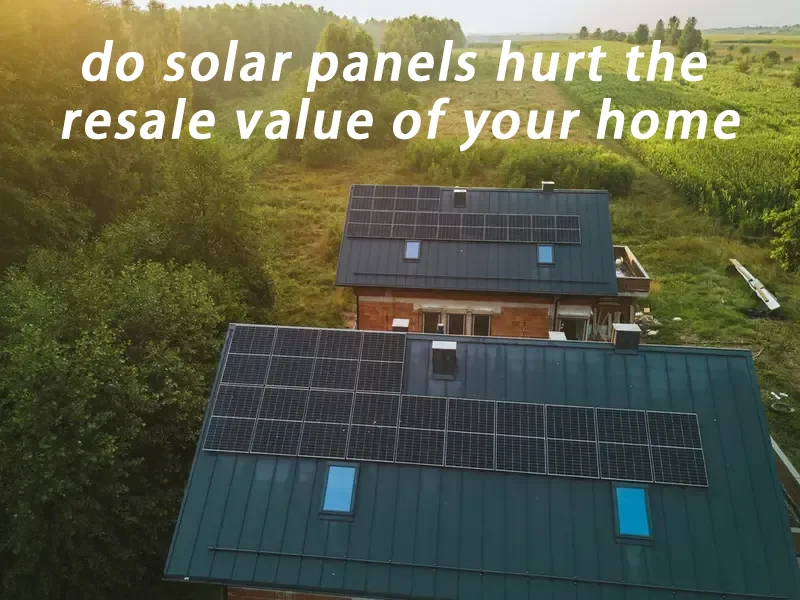Do Solar Panels Hurt the Resale Value of Your Home?

The short answer is no—in most cases, they actually boost it. But as with all things real estate, the truth depends on a few key factors: ownership, system age, financing option, and, of course, location.

Solar Panels in 2025: Figures Tell a Sunny Story
According to Zillow’s 2025 housing trends report, homes with solar panels that were paid for in cash sold for an average of 4.1% more than comparable non-solar homes. In energy-expensive states like California, Arizona, and New York, that premium was 6–10%.
A NerdWallet analysis (2025) confirmed that finding: solar installations can add up to 10% to property value, depending on ownership and energy rates. Meanwhile, the Lawrence Berkeley National Laboratory (LBNL) found that home buyers are willing to pay about $4 per watt of installed solar capacity—about $15,000 more for a medium-sized 3.6 kW system.
So, no, solar panels don’t hurt resale value. Indeed, in today’s energy-conscious real estate market, they can help your house sell faster and for more.
When Solar Panels Might Make a Sale Tougher
Here’s where the story gets a little less sunny. If your solar panels are leased or part of a Power Purchase Agreement (PPA), they could actually scare some buyers off.
- Leased panels: Buyers must assume your existing contract—typically including credit checks and future rate hikes they didn’t agree to.
- Financed systems: When there is an outstanding loan balance, that mortgage can cloud negotiations unless paid off before closing.
- Old or inefficient panels: Systems near end-of-life (20+ years old) can be seen as maintenance liabilities, not assets.
In short: ownership matters. If you own your system free and clear, buyers perceive it as an upgrade. If it’s leased or financed, they might perceive it as paperwork.
2025 Regional Differences: Solar-Friendly vs. Skeptical States
Solar’s impact on resale value differs dramatically by region.
- California, Arizona, Nevada: Solar homes can sell for a 10% premium because electricity rates are high and buyer awareness is high.
- Texas, Florida: Moderate appreciation (3–6%) is the norm, but incentives vary by county.
- Midwest states (Ohio, Iowa, for instance): Homebuyers are adopting solar, but value increases remain in the 2–3% range.
- Southeastern states like Alabama: There are some reports (NerdWallet 2025) of negative effects in the range of –5%, mainly in markets where solar is less prevalent or not well perceived.
Think of it this way: solar panels deliver the most value where the sun and electricity bills both shine brightly.
Real-World Experiences: What Homeowners Are Saying
Online forums paint a interesting picture. An Arizona seller claimed to have received $15,000 above asking after pointing out a year of $0 electric bills alongside their listing flyer. On the other hand, a North Carolina seller had to drop their price twice after potential buyers balked at taking over a solar loan.
The lesson? Solar panels can be a strong selling point—but only if buyers are aware of and confident in what they’re getting.
So here’s a thought: would you pay more for a house if you knew your utility bills would vanish? Most homebuyers today say yes.
2026 Market Forecast: Why Solar Premiums Will Continue to Rise
Looking ahead, all indications are that solar’s resale premium will continue to increase into 2026. Here’s why:
- Dropping system costs: As installation prices fall by another 5–10% within the next year, even more homeowners will go solar, rendering it the new normal as a standard feature—just greener than granite countertops.
- Battery integration: Now that home battery storage is mainstreaming (with products like LZY Energy’s LiFePO4 systems), buyers feel more resilience and independence from the grid—i.e., more perceived value.
- Policy incentives: California and New York states, among others, continue to provide incentives for solar ownership in the form of property tax exemptions, which facilitate easier and more profitable resale.
- Rising electricity rates: As utility rates rise, the advantage of solar savings becomes more attractive to buyers who are considering long-term costs.
Experts predict that by the end of 2026, solar-equipped homes could sell for 7–12% more than similar homes without panels.
Pro Tips for Selling a Solar Home in 2025–2026
If you’re preparing to sell your solar-powered home, these steps can make a big difference:
- Show the savings: Print or share a 12-month electricity bill comparison—buyers love seeing hard numbers.
- Have documentation ready: Ownership proof, warranties, and inverter model info all build trust.
- Highlight environmental impact: Market your home as “eco-friendly” or “net-zero ready.” These phrases resonate with today’s buyers.
- Deal with a “green” realtor: Realtors who are familiar with solar homes know how to properly market them for optimal value.
So, Do Solar Panels Harm the Resale Value of Your Home?
Only if you don’t have them. In nearly every other circumstance, they enhance it—economically, environmentally, and even visually. As we near 2026, solar panels aren’t a fad; they’re emerging as a core component of property value in the clean energy economy.




